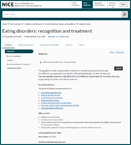Palabras clave:
Biblioteca - Infectología - Guías de práctica clínica
Tipos de documento
Novedades
 Infectología Página 1 de 1
Infectología Página 1 de 1
Guías de práctica clínica |

Año: 2021
This guideline sets out an antimicrobial prescribing strategy for secondary bacterial infection of eczema and covers infection of other common skin conditions. It aims to optimise antibiotic use and reduce antibiotic resistance. The recommendations are for adults, young people and children aged 72 hours and over. They do not cover diagnosis.
|

Año: 2021
The purpose of this guideline is to maximise the safety of children and adults who have gastrointestinal or liver conditions treated with drugs affecting the immune response during the COVID 19 pandemic. It also aims to protect staff from infection and enable services to make the best use of NHS resources.
|

COVID-19 rapid guideline: dermatological conditions treated with drugs affecting the immune response
Año: 2021
The purpose of this guideline is to maximise the safety of children and adults who have dermatological conditions treated with drugs affecting the immune response during the COVID-19 pandemic. It also aims to protect staff from infection and enable services to make the best use of NHS resources.
|
Página 1 de 1, mostrando 3 de un total de 3











